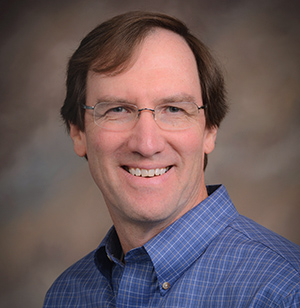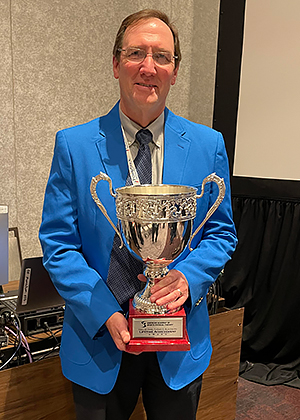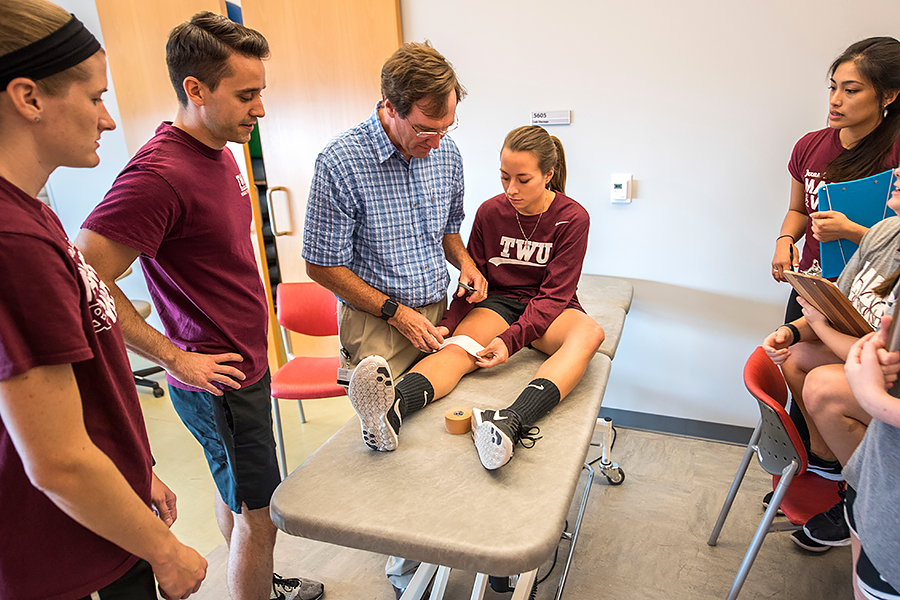Serendipitous path led to fulfilling career for PT associate director

March 20, 2024 – DENTON – Planning is usually a good thing. Especially when it comes to your career. But, as Mark Weber, PT, PhD, SCS Emeritus, ATC will attest to, sometimes, you have to be open to taking an alternate route.
Weber, an associate director in the Texas Woman’s School of Physical Therapy at the Dallas Center, took an abrupt turn early in his career – and led him to a pioneering role in the field of sports PT. It could have been that Weber forged a different path as a PT clinician; but a chance invitation from an employer led him in a new direction.
For over 30 years, Weber has worked as an academic, a board-certified sports physical therapist and an athletic trainer. He left a footprint in nearly every aspect of the specialty practice of sports PT from the certification process of clinical specialists to the accreditation of physical therapist residency and fellowship education programs.
Weber volunteered in every position possible with the American Board of Physical Therapy Specialties (ABPTS), eventually serving as chair and board member. He also served as chair and board member of American Board of Physical Therapy Residency and Fellowship Education (ABPTRFE) and believes he is the only person to serve as chair of both boards. The activities within these boards have a significant impact on the practice of sports PT.
Last February, Weber received the Turner A. Blackburn Hall of Fame/Lifetime Award at the American Physical Therapy Association (APTA) Combined Sections meeting.

The award honors an American Academy of Sports Physical Therapy (AASPT) member whose contributions to the specialty of sports physical therapy through leadership, influence and achievements have been demonstrated for a minimum of 25 years. The AASPT represents sports physical therapists.
“I was rather shocked,” Weber said. “It was surreal and very unexpected. I didn’t think what I was doing was having this kind of impact, but apparently it did.”
When he accepted his award, Weber spoke about the importance of planning your career.
“Everyone says it and I agree, but if I had stuck to my plan and not taken the opportunity to do something I wasn’t ever thinking about doing, I would have missed all of this. Sometimes unplanned, serendipitous opportunities … it’s worth it to go down that path just to see where that leads you. When I came out of PT school, sports PT was not where I was headed,” Weber said.
When Weber graduated from PT school in 1984, his first job was as an assistant director of PT at a hospital in rural Kentucky. One day, his boss asked him to help cover some high school football games.
At that time, there was little or no medical coverage at rural high school games in Kentucky. Weber isn’t sure why he said yes but quickly discovered he loved being on the sidelines and rehabbing athletic injuries.
“I enjoyed working with the athletes and the environment,” Weber said. “When I started doing it, it was like, ‘hey, I think I found my niche.’ ”
It became clear to Weber he needed more training.

“I realized rapidly that I needed to learn more to do the job correctly,” Weber said. “I never should have been on the sidelines because I wasn’t trained for it. At least I recognized that I needed training and became both a certified athletic trainer and a board-certified sports physical therapist.”
Accredited and licensed physical therapists can further specialize by becoming board certified. A sports-certified specialist (SCS) is a board certification administered through the ABPTS. The first SCS exam was administered in 1987.
Weber was board certified in 1993 and believes he was one of the first 100 board-certified sports physical therapists in the country. At the certification ceremony, he was asked if he could help write board exam questions. Weber again said yes. That led to serving on committees, councils and boards that oversee the development of the board exam as well as writing the description of the sports physical therapy specialty practice. This document defines the necessary knowledge, skills and attributes of a sports physical therapist.
After getting board certified, Weber’s area of clinical practice shifted almost exclusively to high school and college athletes. He taught physical therapy at the University of Mississippi Medical Center and was involved in the Medical Centers sports PT residency program, the only one in Mississippi. He also worked high school games and in training rooms at local colleges and saw the benefits that his volunteer work was having in his job as a physical therapist.
“Through my service to AASPT, ABPTS and ABPTRFE I had the opportunity to work with really knowledgeable, excellent individuals,” Weber said. “I learned so much in the process. I know my athletes were treated better because of those interactions with those people. I know my residents were trained better because of those interactions. You can’t measure it. You go work with those people and you have these conversations about this and that, relative to sports and you are growing constantly, the knowledge base is growing. It certainly kept me interested and driving me forward. While it was a fair amount of work - all volunteer - I think it was well worth it.”
Weber retired in 2016 from UMMC with a dream of moving to the mountains. But he felt a pull back to academics and saw an opportunity at Texas Woman’s.
“TWU in the PT world is a big deal,” Weber said. “They were willing to take a chance on me.”
He may have missed a shot at mountain life, but TWU gained a PT expert with experience and leadership.
Media Contact
Amy Ruggini
Digital Content Manager
940-898-3628
aruggini@twu.edu
Page last updated 11:33 AM, May 30, 2024